Events
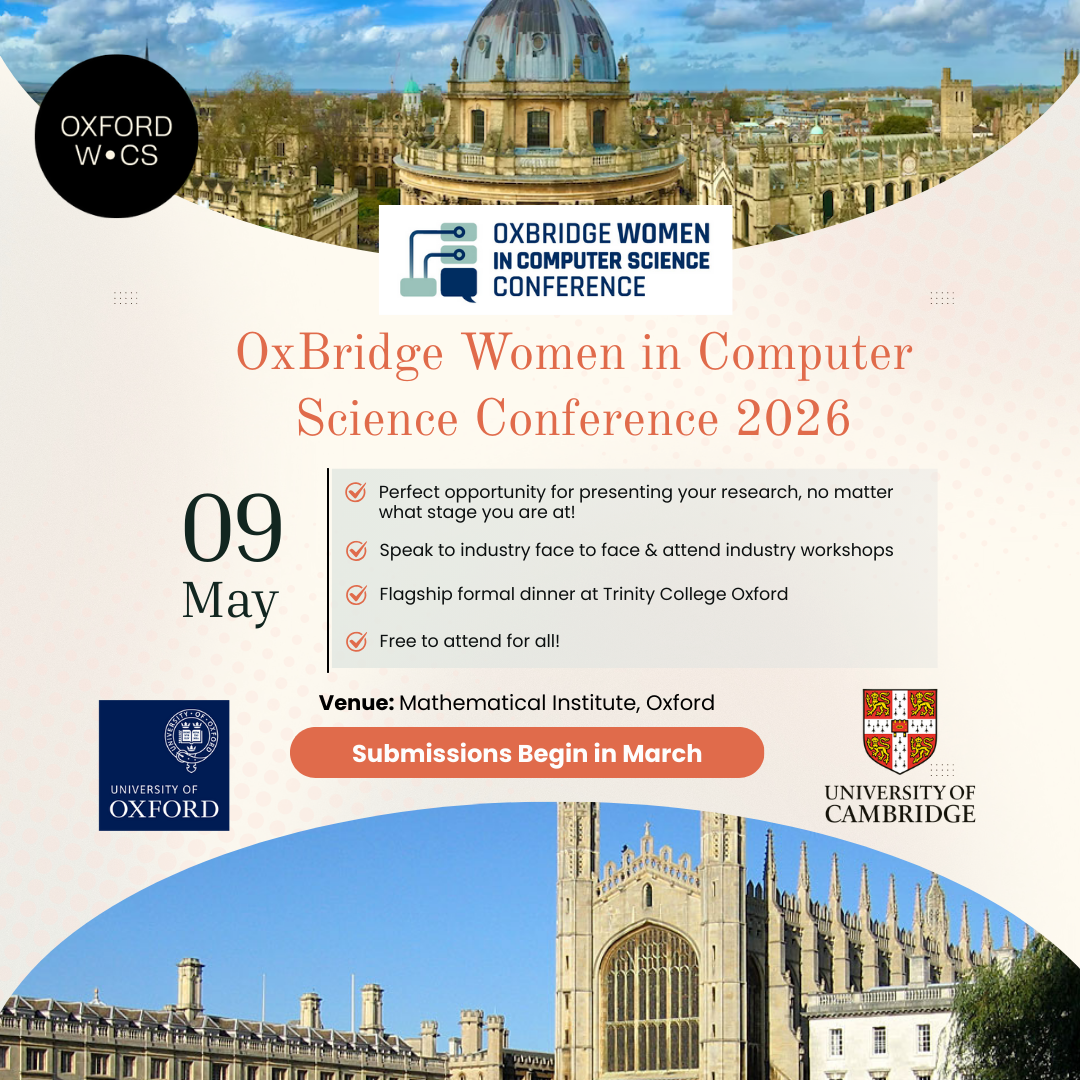
OxBridge Women in CS Conference
Saturday 9th May | Mathematical Institute
Save the date for our annual Oxford & Cambridge Women in CS Conference! We will be opening abstract submissions in March for posters and oral presentations!
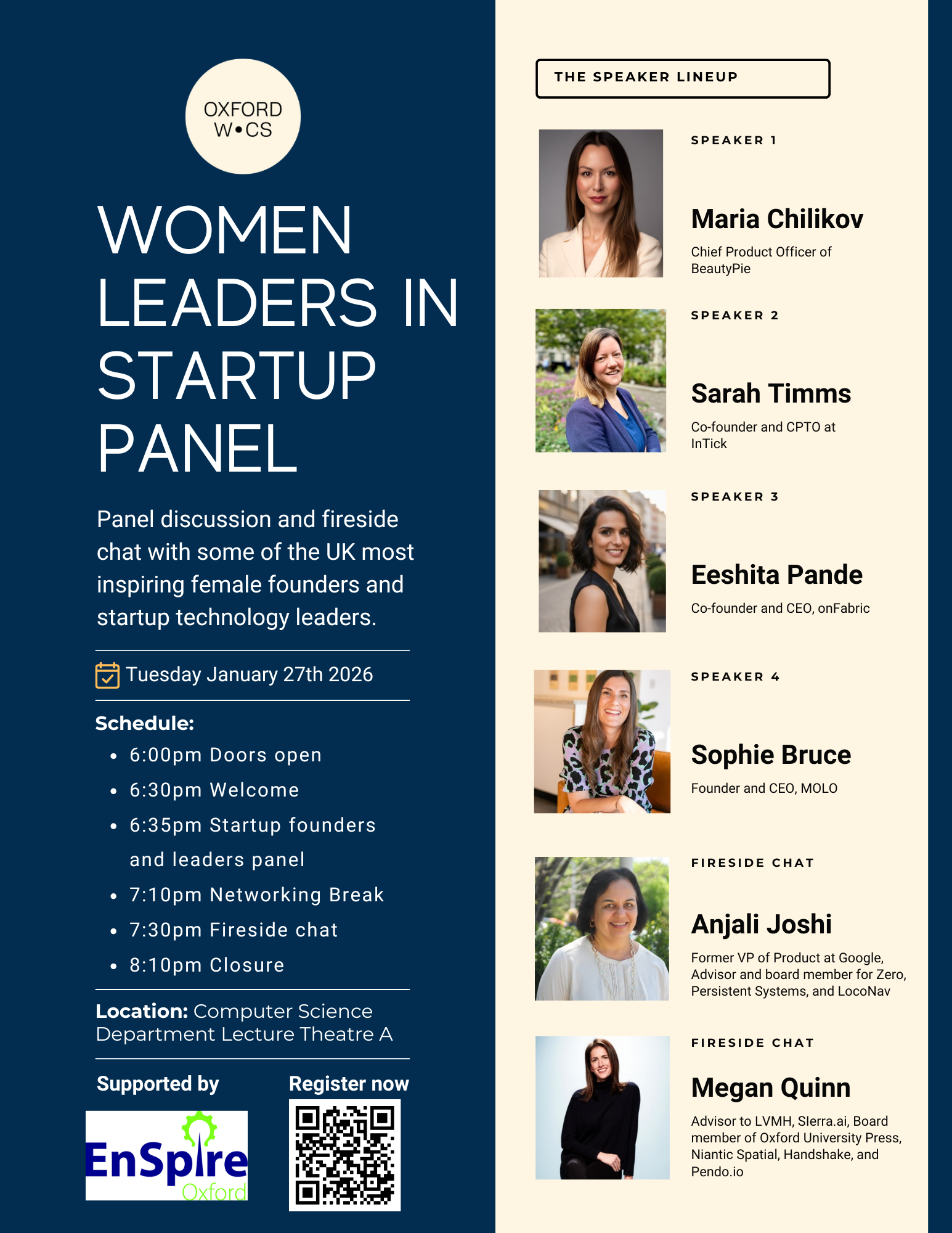
Women Leaders in Startups Panel Talk
Tuesday 27th January 6-8 pm | CS Department, Lecture Theatre A
Panel discussion and fireside chat with some of the UK most inspiring female founders and startup technology leaders. The objective is to share insights from hands-on leaders in the startup world, about the challenges and opportunities presented by entrepreneurship.

Welcome Back Social Hilary Term 2026
Join us to warm up with a hot chocolate and catch up at the start of term. Register here for a free hot chocolate!

Industry Event: Cocktail Social x Jump Trading
Interested in learning about the intersection between technology and trading? Join Jump's team of engineers, quants, and recruiters for drinks and canapes from 7.00pm on Tuesday 18 November. Sign-up is required for this event.

Undergraduate Sip and Solve
Undergraduates - are the problem sheets starting to pile up? Come to Sip and Solve for a relaxed study session with other OxWoCS members, fueled by free snacks and drinks!
This is a drop-in session, feel free to come and go whenever you want!
Sign-ups are not required!

OxWoCS Annual Departmental lunch
Join us for the annual departmental lunch. No Signup required!

OxWoCS Undergrad Dinner
Join us for our annual undergraduate dinner at Franco Manca! Meet with other womxn in CS. Register using the sign up below (spaces will be confirmed by email with your order request).

OxWoCS Postgraduate Dinner
Join us for our postgrad dinner at Franco Manca! Meet with other womxn in CS. Register using the sign up below (spaces will be confirmed by email with your order request).

TheTradeDesk - Resume Upgrade Workshop
Join us for an engaging industry workshop with The Trade Desk (TTD), one of the world’s leading technology companies in digital advertising.
This session, led by representatives from TTD's recruitment team, will focus on “How to Make Your Résumé Pop”. After a short presentation, attendees will have the chance to take part in a CV clinic, where you can ask questions and get tailored advice from recruiters.
The room will be open from 11:30 am for informal conversations before the session begins at 12:00 pm. Come early, grab a seat, and enjoy free pizza and boba while networking with fellow students and industry

OxWoCS Industry Dinner MT25
Connect with fellow OxWoCS members and our sponsors: The Trade Desk, Jane Street and GSA Capital over a 3 course meal.
Each table will consist of OxWoCS members and two industry representatives from each company. We will ask our sponsors to rotate between tables, so you will have the opportunity to talk to all the industry representatives.
Please fill in this form: bit.ly/oxwocs-ind to sign up!

Undergraduate Sip Solve and Syntax
“Sip. Solve. Syntax. Because good ideas brew best together.

Boba-Tea Social
Take a break from studying to enjoy a sweet treat with friends!😎
There is truly no better way to start week three than an afternoon boba with OxW*CS members. Make sure to sign up because drinks are on us!🧋
Sign-Up Link: https://luma.com/altz0zcn

Wine and Painting Event
Join us for a relaxing evening of wine and painting to connect with other OxWoCS members!
All materials and drinks will be provided (including non-alcoholic options and snacks). Just bring yourself and let the creative juices flow!
Please contact us if you have any dietary requirements!
Sign up: https://luma.com/is2dd3iw

G&D's Ice cream social
Join us at G&D's for some ice cream and to meet your fellow OxWoCS members! Sign up here for an ice cream voucher! 🍦
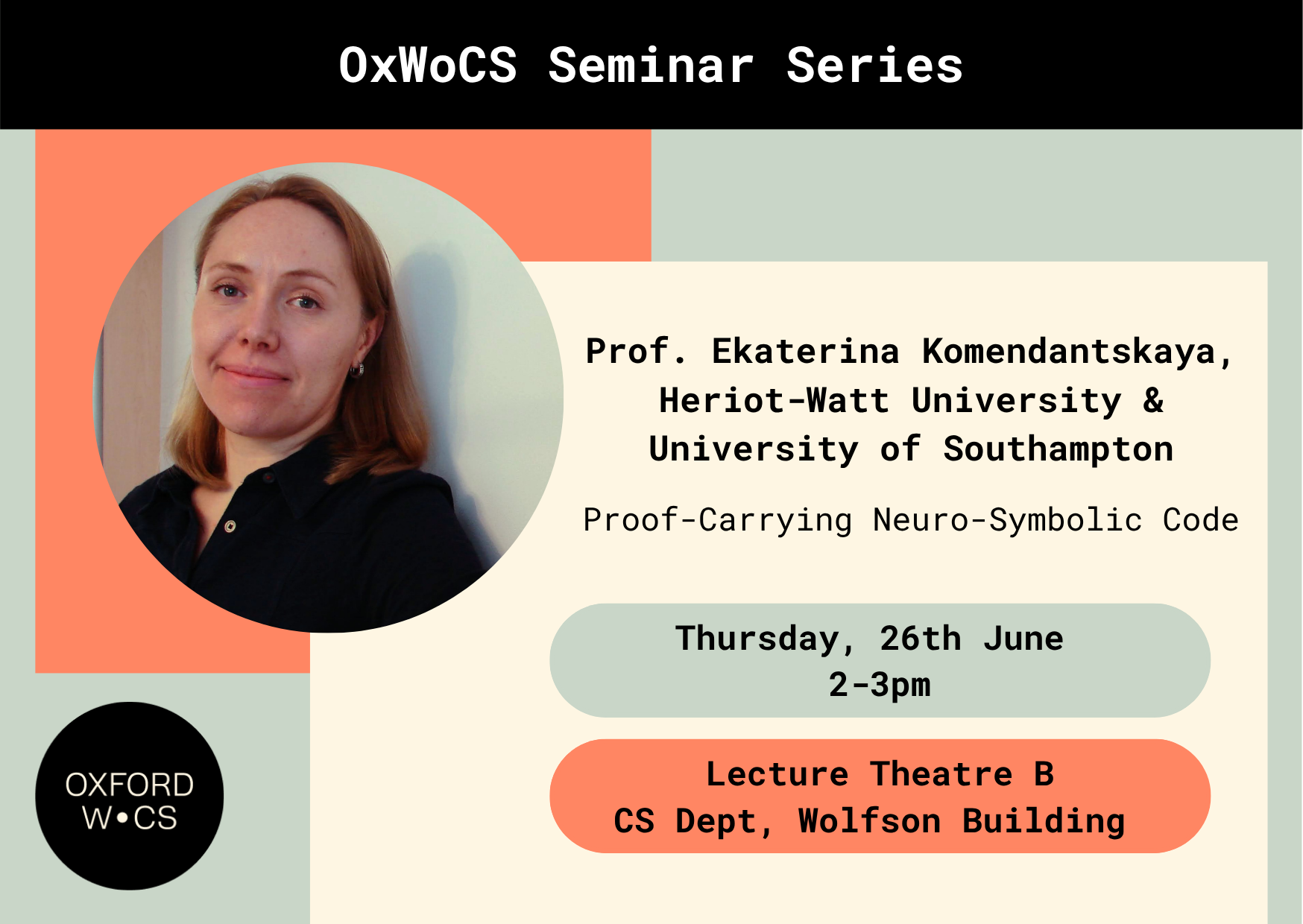
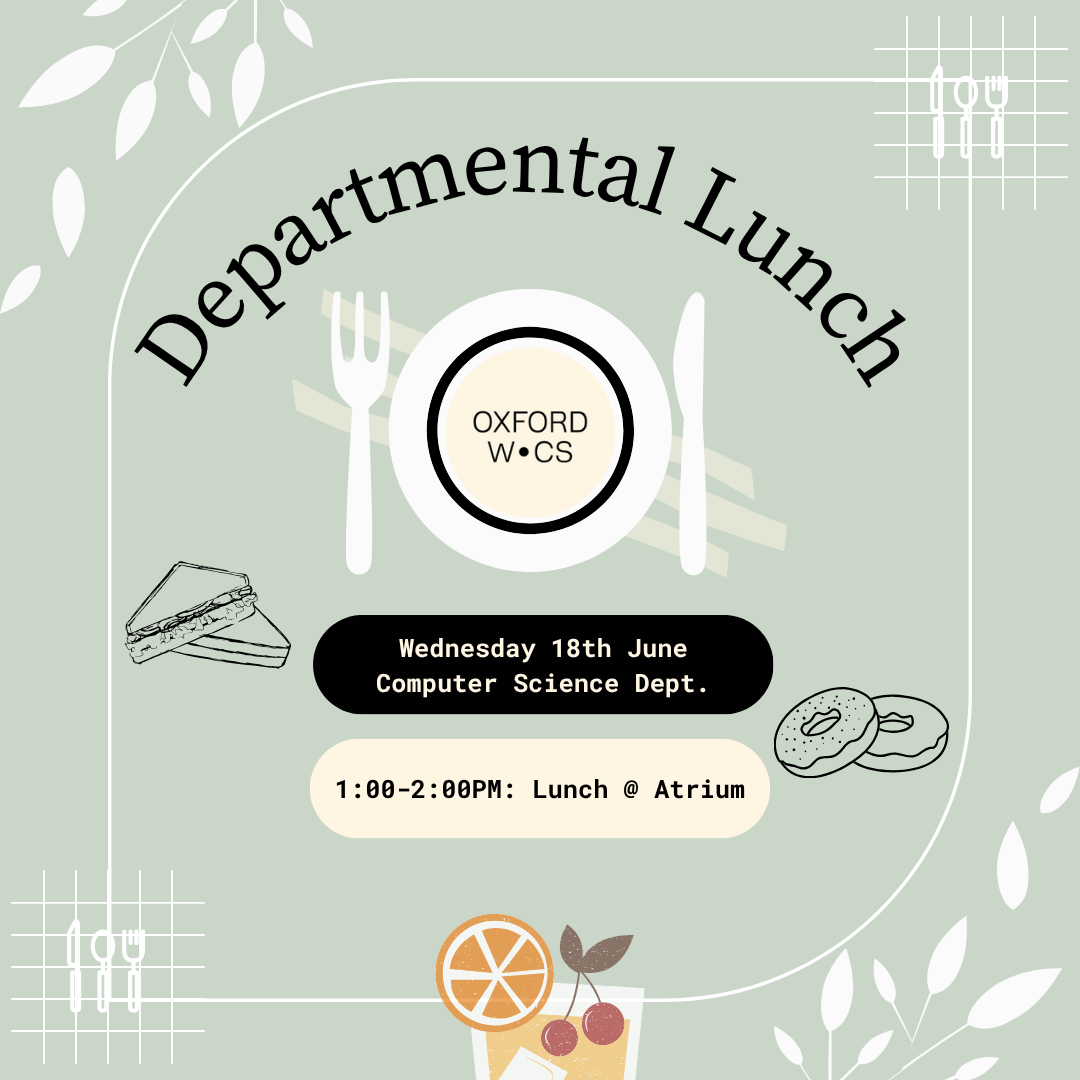
Departmental Lunch
Wednesday 18th June 1-2pm | Atrium @ CS Dept
Our last departmental lunch for the year!! Come by for a free lunch (and doughnuts!) in the CS Department and celebrate the wonderful year we've had together 💗
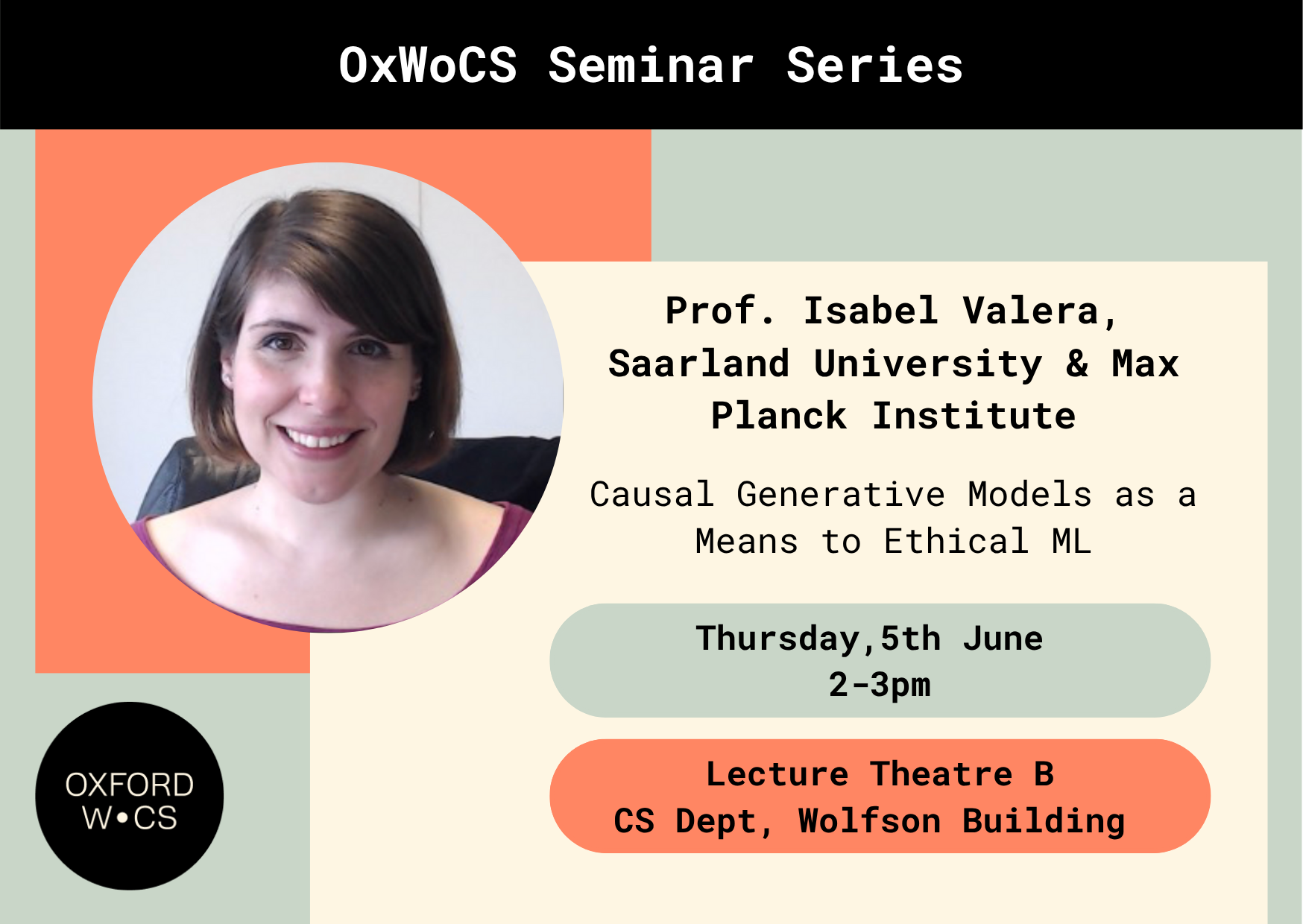
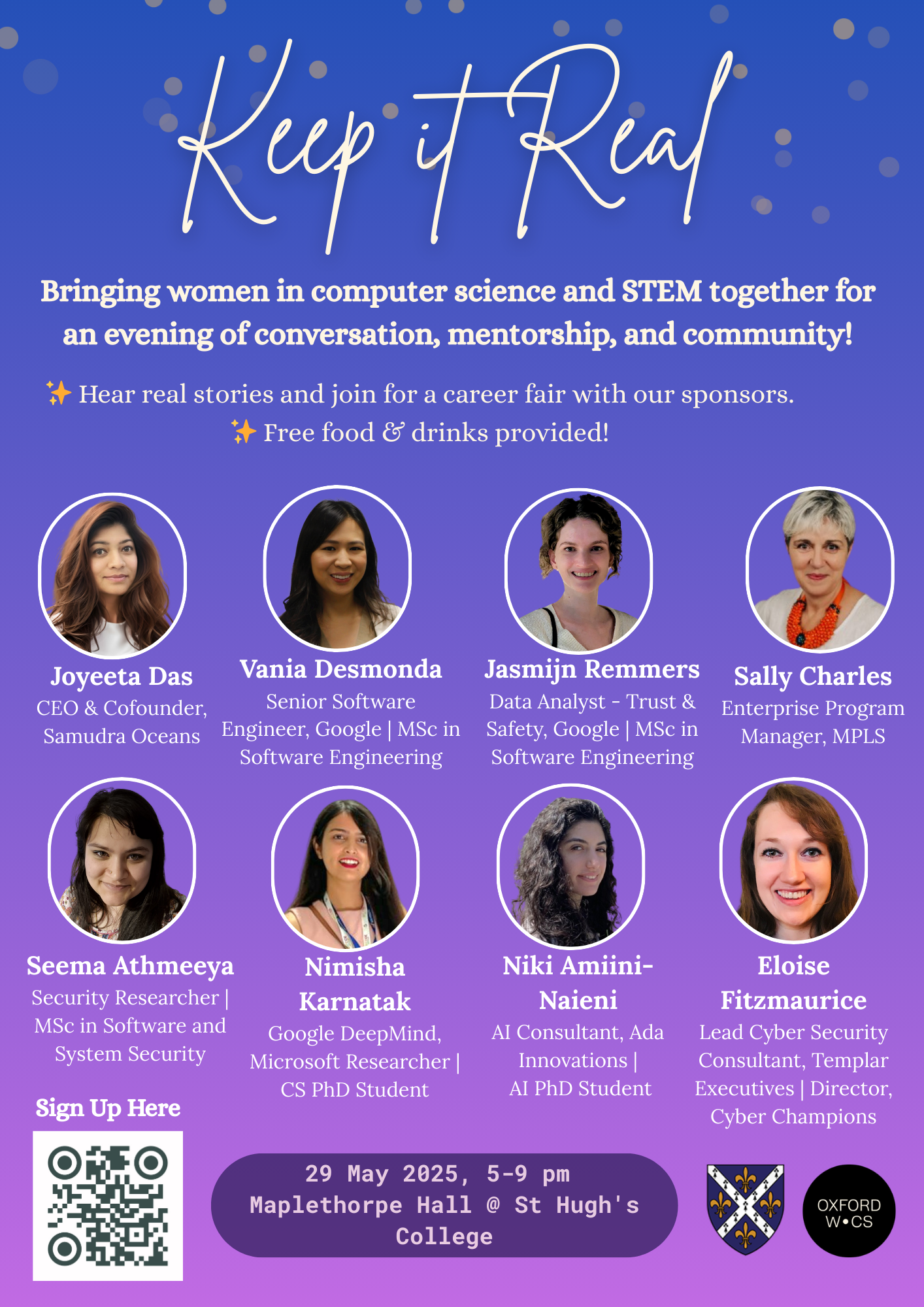
Keep It Real
Thursday, May 29th 5-9pm | Maplethorpe Hall @ St. Hugh's College
Keep It Real is OxWoCS’ flagship evening event, created to spotlight the unfiltered journeys of women in STEM. This immersive experience brings together students, researchers, and professionals for a night of honest storytelling, career insight, and community building. Expect powerful keynote moments, an energising panel on resilience and leadership, mentorship circles, a dynamic career fair, and more 🎉 Spaces are limited, so sign up quickly!
✨ Sign up: https://forms.gle/eGYLoQfQPmz4MDLz5

Join the Committee! OxWoCS AGM and Hustings (2025-26)
Save the date for our AGM meeting coming up on May 20th! We will be running our election hustings and also going over the spectacular year we've had. Pizza dinner will be provided as well 🍕

Graduate Sip, Snack, and Syntax
Thursday, May 15th 4:30-6:30pm | Common Room @ CS Dept
Calling all female and non-binary graduate students in CS — join for an evening of coding, conversation, and community at Sip, Snack & Syntax! Bring along any code you’re working on — whether it’s a side project, coursework, or just an idea — and spend time in a relaxed, collaborative environment. No pressure, just a chance to troubleshoot, share insights, and connect with others over good code and great company. No sign-ups needed, just drop in! 🤗
🧃 Soft drinks and refreshments provided — think snacks, mocktails, and plenty of treats to keep the ideas flowing.

GirlsWhoML: Transformers
Mondays 5-7pm in Hilary Term | In-Person & Online
Are you interested in a practical introduction to machine learning? Sign up here for GirlsWhoML! The format is an hour-long lecture, followed by a practical with a provided Jupyter notebook.
The course will be delivered Monday evenings, 5-7 pm, on the following dates:
✦ Thu 16th Jan: Intro to Python (this session isn't on a Monday!)
✦ Mon 20th Jan: Linear Regression
✦ Mon 27th Jan: Logistic Regression
✦ Mon 3rd Feb: Recap
✦ Mon 10th Feb: Neural Networks
✦ Mon 17th Feb: Convolutional Neural Networks
✦ Mon 24th Feb: Transformers
Sign up:https://forms.gle/bDjrq8aW886SCw6W7

GirlsWhoML: Convolutional Neural Networks
Mondays 5-7pm in Hilary Term | In-Person & Online
Are you interested in a practical introduction to machine learning? Sign up here for GirlsWhoML! The format is an hour-long lecture, followed by a practical with a provided Jupyter notebook.
The course will be delivered Monday evenings, 5-7 pm, on the following dates:
✦ Thu 16th Jan: Intro to Python (this session isn't on a Monday!)
✦ Mon 20th Jan: Linear Regression
✦ Mon 27th Jan: Logistic Regression
✦ Mon 3rd Feb: Recap
✦ Mon 10th Feb: Neural Networks
✦ Mon 17th Feb: Convolutional Neural Networks
✦ Mon 24th Feb: Transformers
Sign up:https://forms.gle/bDjrq8aW886SCw6W7

GirlsWhoML: Neural Networks
Mondays 5-7pm in Hilary Term | In-Person & Online
Are you interested in a practical introduction to machine learning? Sign up here for GirlsWhoML! The format is an hour-long lecture, followed by a practical with a provided Jupyter notebook.
The course will be delivered Monday evenings, 5-7 pm, on the following dates:
✦ Thu 16th Jan: Intro to Python (this session isn't on a Monday!)
✦ Mon 20th Jan: Linear Regression
✦ Mon 27th Jan: Logistic Regression
✦ Mon 3rd Feb: Recap
✦ Mon 10th Feb: Neural Networks
✦ Mon 17th Feb: Convolutional Neural Networks
✦ Mon 24th Feb: Transformers
Sign up:https://forms.gle/bDjrq8aW886SCw6W7

Departmental Lunch
Wednesday, February 5th 1-2pm | Atrium @ CS Dept
Come and chat with the committee and other members of OxWoCS and enjoy a free Taylors lunch in the CS Department!
✨ Sign up: https://forms.gle/TVvsWnbmwAq11PXL8

GirlsWhoML: Recap
Mondays 5-7pm in Hilary Term | In-Person & Online
Are you interested in a practical introduction to machine learning? Sign up here for GirlsWhoML! The format is an hour-long lecture, followed by a practical with a provided Jupyter notebook.
The course will be delivered Monday evenings, 5-7 pm, on the following dates:
✦ Thu 16th Jan: Intro to Python (this session isn't on a Monday!)
✦ Mon 20th Jan: Linear Regression
✦ Mon 27th Jan: Logistic Regression
✦ Mon 3rd Feb: Recap
✦ Mon 10th Feb: Neural Networks
✦ Mon 17th Feb: Convolutional Neural Networks
✦ Mon 24th Feb: Transformers
Sign up:https://forms.gle/bDjrq8aW886SCw6W7

GirlsWhoML: Logistic Regression
Mondays 5-7pm in Hilary Term | In-Person & Online
Are you interested in a practical introduction to machine learning? Sign up here for GirlsWhoML! The format is an hour-long lecture, followed by a practical with a provided Jupyter notebook.
The course will be delivered Monday evenings, 5-7 pm, on the following dates:
✦ Thu 16th Jan: Intro to Python (this session isn't on a Monday!)
✦ Mon 20th Jan: Linear Regression
✦ Mon 27th Jan: Logistic Regression
✦ Mon 3rd Feb: Recap
✦ Mon 10th Feb: Neural Networks
✦ Mon 17th Feb: Convolutional Neural Networks
✦ Mon 24th Feb: Transformers
Sign up:https://forms.gle/bDjrq8aW886SCw6W7

Professional Headshots
Tuesday, January 21st 3-4pm | Atrium @ CS Dept
Come get a professional head shot by a hired photographer! We will send a scheduled 5-minute time slot during this hour period. Please sign up below so we know numbers, we will check names upon arrival.

GirlsWhoML: Linear Regression
Mondays 5-7pm in Hilary Term | In-Person & Online
Are you interested in a practical introduction to machine learning? Sign up here for GirlsWhoML! The format is an hour-long lecture, followed by a practical with a provided Jupyter notebook.
The course will be delivered Monday evenings, 5-7 pm, on the following dates:
✦ Thu 16th Jan: Intro to Python (this session isn't on a Monday!)
✦ Mon 20th Jan: Linear Regression
✦ Mon 27th Jan: Logistic Regression
✦ Mon 3rd Feb: Recap
✦ Mon 10th Feb: Neural Networks
✦ Mon 17th Feb: Convolutional Neural Networks
✦ Mon 24th Feb: Transformers
Sign up:https://forms.gle/bDjrq8aW886SCw6W7

Seminar Series: Dr. Jenjira Jaimunk
Many service providers offer their services in exchange for users' private data. Despite recent regulations aimed at protecting user privacy, users often have limited control over how their data is collected and used. To address these privacy concerns in cloud-IoT applications, this study proposes a novel architecture, called Data Bank, which empowers users with fine-grained control over their data. Data Bank employs a category-based data access (CBDA) model encompassing the entire data lifecycle, from data collection from IoT devices to data sharing with services. The study demonstrates how dynamic policies can be defined using a new attribute-based instance of CBDA, and explores the use of policy graphs to visualise and analyse these policies.
Sign up: https://forms.office.com/e/SrRk1WN0Pz

GirlsWhoML: Intro to Python
Mondays 5-7pm in Hilary Term | In-Person & Online
Are you interested in a practical introduction to machine learning? Sign up here for GirlsWhoML! The format is an hour-long lecture, followed by a practical with a provided Jupyter notebook.
The course will be delivered Monday evenings, 5-7 pm, on the following dates:
✦ Thu 16th Jan: Intro to Python (this session isn't on a Monday!)
✦ Mon 20th Jan: Linear Regression
✦ Mon 27th Jan: Logistic Regression
✦ Mon 3rd Feb: Recap
✦ Mon 10th Feb: Neural Networks
✦ Mon 17th Feb: Convolutional Neural Networks
✦ Mon 24th Feb: Transformers
Sign up:https://forms.gle/bDjrq8aW886SCw6W7

TheTradeDesk x OxWoCS- Beyond the Resume: Discovering your unique value
Join us for a workshop to learn more about The Trade Desk and spend time learning how to identify your personal values and align them with your short-term and long-term goals. We will explore how to find your “why” to set up your own personal brand, no matter online or when you present yourself to others. We'll provide practical tips on LinkedIn branding, networking, confidence building which you can hopefully use moving forward!
Food and drinks will be provided.
Sign up: https://bit.ly/oxwocs-skills

















